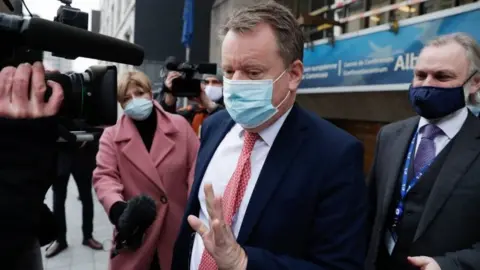Brexit: Trade talks 'have reached critical stage'
 European Commission
European CommissionThe UK government has said talks with the EU on reaching a post-Brexit trade deal have reached a "critical stage".
With time running out, the two sides are still arguing over fishing rights and business competition rules.
Boris Johnson and European Commission chief Ursula von der Leyen have been discussing the state of negotiations - their second phone call in 48 hours.
The EU mood was described as "gloomy", while the UK said it was still "working to get" an agreement in place.
If a deal is not reached and ratified by 31 December, the UK and EU could introduce import charges on each other's goods.
The phone call between the UK prime minster and European Commission president is reported to have lasted for 90 minutes, but neither side has yet to release a statement on what was discussed.
EU chief negotiator Michel Barnier and his UK counterpart Lord Frost are still locked in talks.
Cabinet Office minister Penny Mordaunt told the House of Commons: "We are at a critical moment in the negotiations."
She added: "We are all working to get a deal, but the only way that's possible is if it's compatible with our sovereignty and takes back control of our country's trade and waters."
The UK was prepared to walk away from negotiations if the EU could not "find compromises", Ms Mordaunt said.
Asked when the cut-off point for a deal was, a European Commission spokesman said: "We are not going to speculate on a last-chance date.
"We are fully committed to substantial negotiations. We've always said and continue to say it's the substance that prevails over timing."
Earlier, Irish Foreign Minister Simon Coveney described the EU negotiating team's frame of mind as "gloomy" and "downbeat".

Brexit - The basics
- Brexit happened but rules didn't change at once: The UK left the European Union on 31 January but leaders needed time to negotiate a deal for life afterwards - they got 11 months
- Talks are on again: The UK and the EU have until 31 December to agree a trade deal as well as other things, such as fishing rights
- If there is no deal: Border checks and taxes will be introduced for goods travelling between the UK and the EU. But deal or no deal, we will still see changes

What are they arguing about?
The EU is warning that, without ongoing access to UK waters for its fleets, UK fishermen will no longer have special access to EU markets to sell their goods.
But the UK argues that what goes on in its own waters should be under its control as a sovereign country.
The UK and EU are also at loggerheads over the so-called "level playing field" - a set of shared rules and standards to ensure businesses in one country do not have an unfair advantage over their competitors in others.
Brussels wants the UK to adhere to EU rules on workers' rights, environmental regulations and state aid, but the UK says the goal of Brexit is to break free from following common rules and reassert national sovereignty.
And the two sides disagree on how any future trading disputes should be resolved.
 EPA
EPATight timetable
If the EU and UK reach a deal, it will have to be turned into legal text and translated into all EU languages, then ratified by the European Parliament by 31 December.
The deadline also applies to the UK government, which is likely to introduce legislation implementing parts of any deal reached, which MPs would vote on.
The 27 EU national parliaments may also need to ratify an agreement, depending on the contents of the deal.
Big week ahead
Later on Monday, the UK Internal Market Bill will return to the House of Commons.
It could allow the government to break international law, by overriding elements of its original Brexit treaty with the EU, known as the withdrawal agreement.
The EU is unhappy with this, as is the House of Lords, which voted to scrap key parts in the bill.
The government is expected to put those measures back in the bill, in the Commons on Monday evening.
But in what is being seen as an "olive branch" to the EU, the UK government has put out a statement saying it will drop the most controversial parts of the Internal Market Bill - those that would break international law - if a trade deal is done.
The Taxation (Post-Transition Period) Bill, which contains more powers to break the legal requirements of the withdrawal agreement, will also return to the Commons this week.
And on Thursday, EU leaders will meet in Brussels for a two-day summit where they could sign off a deal, if the two sides can reach an agreement by then.


